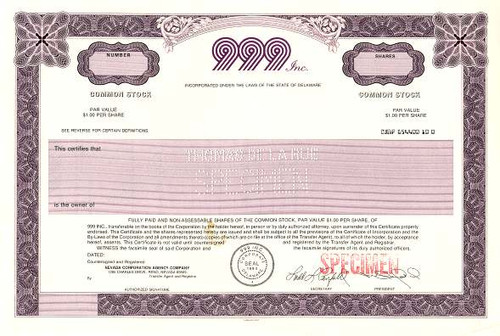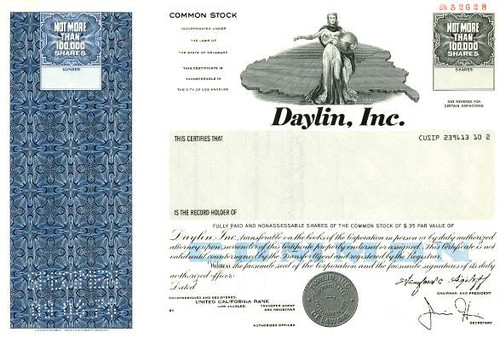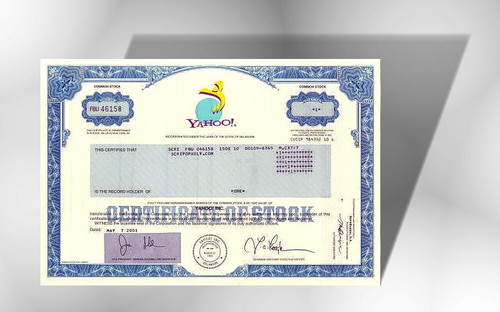Beautifully engraved specimen stock certificate from Viacom International Inc. printed around 1977. This historic document was printed by the American Banknote Company and has an ornate border around it with a vignette of a woman with two globes on either side. This item has the signatures of the Company's President, Ralph Baruch and Treasurer. This is the first time we have had this certificate for sale. 
Certificate Vignette The original Viacom began life as CBS Films, Inc., the television syndication division of CBS. In 1971, the division was renamed VIACOM (VIdeo & Audio Communications), and in 1973 it was spun off, amid new FCC rules forbidding television networks from owning syndication companies (the rules were later repealed). Effective December 31, 2005, this corporate entity changed its name to CBS Corporation. The present firm known as Viacom was also established at that date and is a new spin-off company created during the CBS-Viacom split. Viacom was highly profitable during the 1970s and 1980s distributing old CBS classics to syndication, including such landmark shows as I Love Lucy, The Andy Griffith Show and All in the Family (which was later owned by Embassy/Columbia Pictures Television, now called Sony Pictures Television). They also syndicated shows for others, the biggest examples being The Cosby Show and Roseanne (which were produced by Carsey-Werner Productions. Carsey-Werner eventually got big enough to distribute their own shows, mainly because of the success of these two). Viacom's first non-programming acquisition came in 1978 when the company purchased the Sonderling Broadcasting chain, giving it radio stations in New York City, Washington, D.C., Houston, and San Francisco, and one television station, WAST (now WNYT) in Albany, New York. Later that year, Viacom added WHNB-TV in New Britain, Connecticut, changing its call letters to WVIT. The early 1980s saw Viacom sorting through the Sonderling stations with several being donated, swapped, or being the nucleus for new corporations--for example, WOL in Washington launched the Radio One group, which today is the largest African-American-owned broadcasting corporation. In 1983, Viacom purchased KSLA-TV in Shreveport, Louisiana, and WHEC-TV in Rochester, New York, in separate transactions, followed in 1986 with (ironically) CBS-owned KMOX-TV in St. Louis; with the purchase, that station's call letters were changed to KMOV. In 1985, Viacom bought Warner-Amex Satellite Entertainment, which owned MTV and Nickelodeon, renaming the company MTV Networks. Viacom also received Warner-Amex's share of Viacom/WASEC joint venture Showtime Networks, Inc, which included Showtime and The Movie Channel. In 1986, Viacom was bought by movie theater owner National Amusements, which brought Sumner Redstone to the company. Redstone retained the Viacom name and made a string of large acquisitions in the early 1990s, announcing plans to buy Paramount Communications, parent of Paramount Pictures, in 1993, and buying the Blockbuster Video chain in 1994. The Blockbuster acquisition gave Viacom access to large television holdings controlled by Aaron Spelling's company, Spelling Entertainment; along with his own productions, Spelling controlled the pre-1973 ABC and NBC back catalogs by way of Worldvision Enterprises and Republic Pictures. In 1999, Viacom made its biggest acquisition to date by announcing plans to buy its former parent CBS Corporation. The merger was approved in 2000, bringing cable channels TNN (now Spike TV) and Country Music Television (CMT) under Viacom's wing, as well as CBS's production units and TV syndicaters Eyemark (formerly Group W) and King World. CBS's production unit and King World (which has since absorbed Eyemark) operated under their own names; however, TNN and CMT were merged into MTV Networks almost immediately. In 2001, Viacom completed its purchase of Black Entertainment Television (BET). As with TNN/Spike TV and CMT, it was immediately integrated into MTV Networks, causing some outcry among BET workers in the Washington area (where BET was based before the merger). As a result, BET was eventually de-integrated from MTV Networks. Although a majority economic interest in Viacom was held by independent shareholders, the Redstone family maintained 71-percent voting control of the company through National Amusements' holdings of Viacom's stock. In 2002, Viacom bought independently-run music channel TMF, which at the time was broadcasting in Belgium and the Netherlands. In June 2004, Viacom bought VIVA Media AG, the German equivalent to MTV. The same month, plans were announced to dispose of Viacom's interest in Blockbuster later that year by means of an exchange offer. Also in 2002, Viacom acquired the remaining shares of Infinity Broadcasting radio chain. And in April 2003, Viacom acquired the remaining ownership shares of Comedy Central from Time Warner, making Comedy Central integrated into MTV Networks. In March 2005, Viacom announced plans of looking into splitting the company into two publicly traded companies. The company was not only dealing with a stagnating stock price, but also the rivalry between Les Moonves and Tom Freston, longtime heads of CBS and MTV Networks respectively. After the departure of Mel Karmazin in 2004, Redstone, who served as Chairman and Chief Executive Officer, decided to split the offices of President and Chief Operating Officer between Moonves and Freston. Redstone was set to retire in the near future, and a split would be a creative solution to the matter of replacing him. The split was approved by Viacom's board June 14, 2005, took effect December 31, 2005, and effectively reversed the Viacom/CBS merger of 1999. The existing Viacom was renamed CBS Corporation and was headed by Moonves. It now includes Viacom's "slow growth businesses", namely CBS, The CW (a merger of UPN and The WB), CBS Radio, Simon & Schuster, CBS Outdoor (formerly Viacom Outdoor), Showtime, CBS Television Studios, CBS Television Distribution and CBS Studios International. These, according to some analysts, were suffocating the growth of the MTV Networks cable businesses. The split effectively made CBS an independent company again. In addition, CBS Corporation was given Paramount Parks (which they sold to amusement park operator Cedar Fair, L.P. on June 30, 2006) and the CBS College Sports Network. Additionally, a new spin-off company was created called Viacom, which was headed by Freston. It comprises MTV Networks, BET Networks, Paramount's movie studio, and Paramount Pictures' home entertainment operations. These businesses are categorized as the high-growth businesses (MTV Networks and BET Networks in particular), and if they were split into a separate company, it could infuse new funds/capital to allow for future acquisitions and expansion. Sumner Redstone still controls 71 percent of the voting stock of both companies and is the chairman of both companies. In September 2006, Redstone fired Freston and named Philippe Dauman as the new head of Viacom. History from Wikipedia and OldCompany.com (old stock certificate research service). About Specimen Certificates Specimen Certificates are actual certificates that have never been issued. They were usually kept by the printers in their permanent archives as their only example of a particular certificate. Sometimes you will see a hand stamp on the certificate that says "Do not remove from file". Specimens were also used to show prospective clients different types of certificate designs that were available. Specimen certificates are usually much scarcer than issued certificates. In fact, many times they are the only way to get a certificate for a particular company because the issued certificates were redeemed and destroyed. In a few instances, Specimen certificates were made for a company but were never used because a different design was chosen by the company. These certificates are normally stamped "Specimen" or they have small holes spelling the word specimen. Most of the time they don't have a serial number, or they have a serial number of 00000. T

Certificate Vignette








